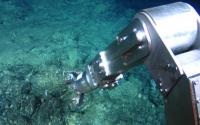Deep sea sponges may hold key to antibiotic resistance

"Deep sea sponges may hold key to antibiotic resistance" — Jessica Aldred — China Dialogue: Ocean — October 09, 2019
The scientists who discovered antibiotic properties in a deep-sea sponge warn that such breakthroughs could be lost in the face of mineral exploitation.
Keywords:
Quicktabs: News
-
Deep seabed mining could have serious impacts on the ocean environment and the future livelihoods and well being of coastal communities. An international, multi-sector approach to management and protection, similar to that under development by the International Seabed Authority under UNCLOS, is needed, if we are to ensure the health and sustainable use of our oceans.
Keywords:Related Quotes:- Deep seabed mining could destroy valuable biodiversity that hasn't even been discovered yet
- Deep seabed environment is a critical ecosystem that needs to be protected
- Deep seabed mining can devastate fish stocks by disrupting the seamounts they depend on
- Seabed mining can have a significant impact on fragile ecosystems
- Light and noise pollution from mingling operations could disrupt fragile ecosystems
- Interest in seabed mining is growing but not enough attention is being paid to the environmental impacts
- Independent analysis shows deep seabed mining more environmentally friendly than land-based alternatives
Parent Arguments:
